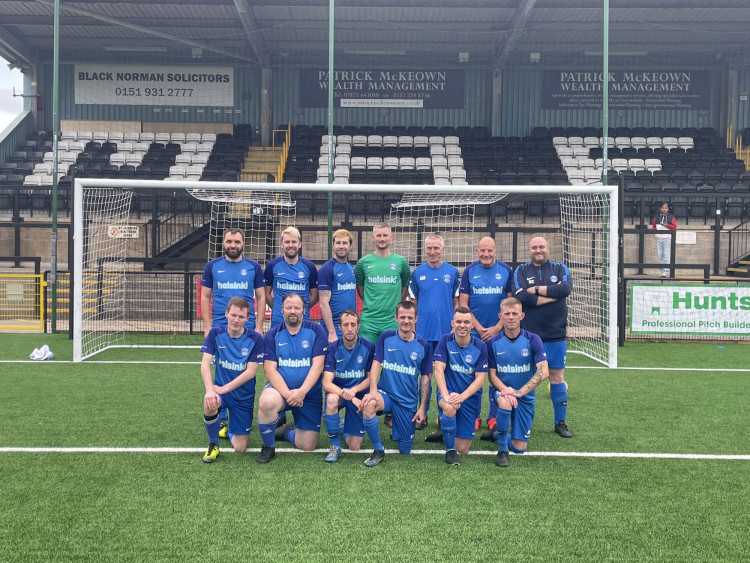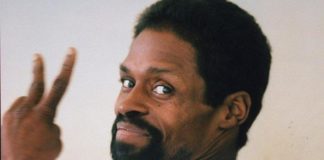Callum Prince grew up in Ashby, playing and coaching football as an openly gay man.
Here, he tells Ashby Nub News about life his life in grassroots football – and the day he fell out of love with the game.
You can read his Rainbow Laces story here.
**********************************************
My name is Callum Prince, I’m 24 years old and for this year’s rainbow laces campaign (2022) I have decided to share my story of being a gay man in grassroots sports.
My hope is that all readers of this article, no matter how they identify, can understand why campaigns like Rainbow Laces are so vital in creating an inclusive environment for everyone.
By having someone like me share my story, anyone out there who finds themselves in a similar position can find some comfort in the knowledge that they are not alone.
My passion for sports began from a very young age, with both my parents being sporty, this naturally rubbed off onto myself.
My dad being a respectable full back during his playing days, he naturally steered me out onto a football pitch as a young child with a local team called Marlborough Roversthe team that my Grandad had been involved with for many years and also that my dad had played for as a junior and senior.
This also included trips to Derby County matches which the club would organise from time to time.
Thankfully my support for them never developed, with my favoured team being Burton Albion, my hometown club.

Over time my attention turned to swimming. I’d been having swimming lessons alongside football ever since I was able to.
During my early teenage years was when I first truly began to understand that I was “different”.
This was quite daunting and scary given the boisterous nature of changing room environments in many sports, swimming being no exception, so I very much kept these thoughts to myself. When I look back now, even at this early age, casual homophobia was the norm in these environments and to stand out as something “different”from the defined “normal” made you a target.
Going into my teenage years, these feelings of being “different” became stronger, to the extent thatI no longer felt comfortable continuing with swimming and so I quit the sport.
At the turn of my 15th birthday, and just after the London 2012 Olympics, some school friends managed to convince me to take up athletics, initially starting with long distance running and indoor endurance events. It soon became apparent, through a school sports day, that I was a decent Javelin thrower.
This led to my close friend at the time dragging me along to Charnwood Athletics Club at Loughborough University.Once again I was back running, but this time as a short distance sprinter. I still cannot decide today if it was the “glamour” associated with sprinting that attracted me, or the good natured and encouraging environment the coach at the time created which drew me in.

At this time I decided I would not hide my sexuality anymore. I came out to my family and friends at the age of 17.
Being a part of the group at Charnwood was my first real positive experience of being able to be myself, feel accepted and not worry in a sporting environment.
The feeling was liberating and made the last year of this endeavour extremely enjoyable. To this day I still feel very lucky to have been coached by, and trained with paralympic champions and world record holders all of whom accepted me for who I am.
I finally came full circle in my sporting journey at the age of 21. At this point I was a huge Burton Albion supporter, a season ticket holder travelling up and down the country week in, week out cheering on the Brewers.
As I grew older I became very aware of the casual homophobia in football and how normalised this was.
Fans would scream “gay” or “faggot” at players on the pitch.I never really questioned or challenged this, something which I now look back on with great sadness and regret.
Thankfully at Albion matches this was very rare due to the family atmosphere that surrounds the club, although in recent years, this language has become increasingly common. It was also at this age that I also decided to support a local Junior U17s team at Ashby Ivanhoe who needed coaches for the upcoming season.

I remember taking one of my first solo training sessions. I made a poor decision during the warm up match, and one of the players reacted poorly.
He shouted across the pitch, calling me a “faggot”. His teammates were horrified. They quickly made him aware that I was gay and that he could not say that. It remains one of the most powerful moments that I have experienced in grassroots sport, the self-education that the other players provided to their teammate, and subsequent heartfelt apology that followed.
It still moves me to this day. I continued to happily coach the team over the next two seasons, proudly sporting my rainbow laces at each match, right up until the point of the dreaded shutdown brought on by COVID-19.
During the COVID-19 lockdown a group of individuals, including myself decided to found a brand new football club called Ashby United Community Football Club. The ethos behind the club was to open up as many opportunities for as many different people to get involved in football in the local community as possible, from Juniors to Vets football.
With this I took a step back from coaching and joined initially as the club’s media man before also holding the position of vice-chair a season later. Taking such a key role at the club gave me a strong feeling of responsibility.
Being an openly gay man in such a position in grassroots football was and still is pretty unheard of.
For this reason I made the decision to become as hands on as possible with the club, to try and support as many people as possible, no matter their background.
I feel a huge sense of pride that we gave every one an opportunity to play the game that so many people love, on their terms.

This included encouraging the club to throw its considerable weight behind the Rainbow Laces campaign, purchasing laces for any player, junior or senior, who wanted to show their support for LGBTQ+ inclusion.
I wanted to show that this club was different to every other local football club, that it truly was an inclusive club. I am still so proud of everything that was achieved, I hope that if it made even one player who may not yet fully understand who they are feel more comfortable, then it was worth it. The club went from strength to strength, boasting more than 20 teams by the time I left.
My time at Ashby United opened the door for me to get my boots back on as a player, taking on the role of reserve goalkeeper in our inaugural season. This was an opportunity I relished, but not without some anxiety.
I proudly sported my rainbow laces every week, championing gay participation in sports.In grassroots football, it is common for teams to provide their own line officials. As reserve goalkeeper, this was a role I took on more often than not.
Despite the exposure to angry players, spectators and officials, often upset at my decisions, I continued to wear my rainbow laces, proud to show who I am. On Sunday 13th June, 2021 my whole world was turned upside down.It began like any other matchday.
A top of the table clash beckoned – an away trip against local team Springfield FC. The excitement in the car with my other team mates was palpable with everyone fired up for the game. A win would see us leap Springfield into first place heading into the final few games of the season.
I took up my usual role of line official for the game. Given the high profile of the match, a large crowd had gathered, mainly supporting the home team.. After a fiercely contested half of football, Ashby led going into the break.

As I crossed the pitch for the beginning of the second half in front of the nearly 100 home supporters, the usual “banter” and jokes were thrown at me.. I shook off this attempt at intimidation. Within the first five minutes of the kick-off a section of the supporters noticed by rainbow laces in my boots.
This was when the homophobic abuse began hurling down upon me.
“”*** GAYS MAN” “OI, FAGGOT” “DID YOUR DAD TOUCH YOU AS A KID?” All of which were followed by a chorus of laughter from other supporters. These and other forms of abuse continued for the next 40 minutes of the second half, on and off inline with the ebb and flow of the game. During the water break I even mentioned the abuse to the referee whose response was tepid, in that he could only intervene if the abuse became physical.
It was in that 45 minutes of the second half of a local grassroots game of football that my life changed forever. I could feel my love, my passion, the place I could escape from any worries, being taken away from me. It was taken away from me.While the support from my teammates after the game and in the coming weeks from the club was unwavering and gave me some comfort, the ongoing back and forth over the FA investigation prolonged the pain.
I had to re-live that day, over and over for months on end. I did not want to play football any longer.I did not want to even watch football. This had a material impact on my off-fieldwork with Ashby and in the end led to myself resigning all my positions at the club and walking away in March 2022.

After my awful experience, I joined an LGBTQ+ team called Leicester Wildecats, anxious and scared about slowly coming back into football.
However from my very first training session with Leicester I knew this was the place I wanted to play, to rekindle my love for the game. It was and certainly is the most welcoming football environment I have ever been involved in.
Even in GFSN (Gay Football Supporters Network) national league matches the sense of inclusion, the sense of community is unrivalled. Such a safe place for Gay footballers shouldn’t need to exist, but to quote a recent article on the GFSN leagues 20th anniversary “it is a league whose aim is not to exist”. I long for the day where I can once again feel comfortable joining a team as a Gay player, where I do not feel worried or intimidated that what happened to me won’t happen again.
Sadly that day is not now. Football has systemic problems with homophobia throughout the game, from the very top to the very bottom. All we can do is keep pushing for change, keep supporting each other on and off the pitch. Be sure change is coming.
I’m proud to support local clubs and colleges to raise awareness around why campaigns such as the rainbow laces are so important to help them be more inclusive spaces for everyone, especially those for those from an LGBTQ+ background. I’m excited to see where the future takes me in local football, now I have my love back for the game and one day I hope that we can truly make sport everyone’s game-after all, inclusion has no off season







